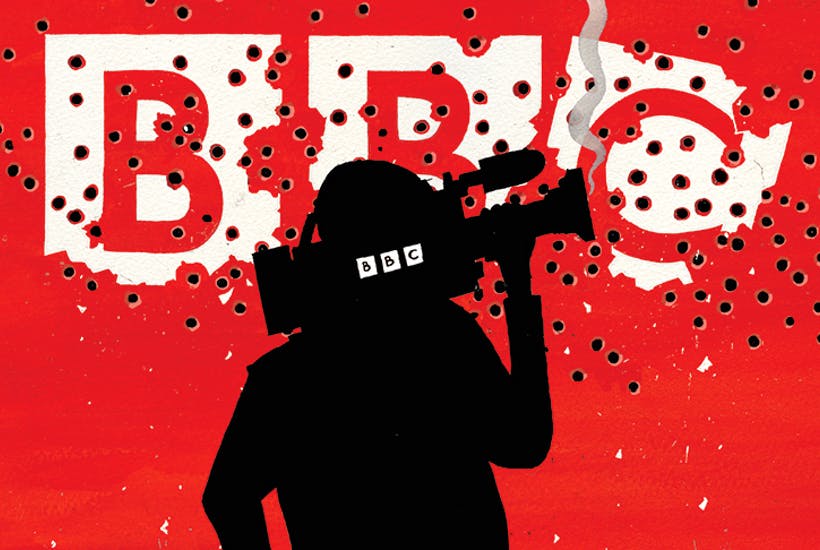Two big kites were launched by the Sunday Times that could, should they fly, redraw the broadcasting landscape. ‘BBC critics set for top jobs in broadcasting’ its front-page headline announced.
The Prime Minister, it suggested, has offered Lord Charles Moore the chairmanship of the BBC and Paul Dacre, the chairmanship of the media regulator Ofcom. Both are former editors of newspapers of the right and neither has much love for what the BBC has become.
For some, it is simply an obscene Tory stitch-up. The former Guardian editor, Alan Rusbridger, was perhaps the most succinct: ‘No process. No joke. This is what an oligarchy looks like.’
Well, ‘Up to a point, Lord Copper’, to borrow the line from Evelyn Waugh’s Scoop, the celebrated satire of print journalism. As Peter Riddell, chair of the Commission for Public Appointments, was quick to point out:
The search for new chairs of the BBC and Ofcom, both regulated by the Commission, have not yet been launched. Each will involve a Senior Independent Panel Member to provide assurance of a fair and open process as in the Government’s Governance Code.
Peter is a former FT man and an ex-director of the Institute of Government. It is fair to say he knows what he is talking about.
The thesis is that public service broadcasting needs a shot across its bows, not least on impartiality
What is more, the Secretary of State for Digital, Culture, Media and Sport confirmed this on the BBC’s Andrew Marr show. But Oliver Dowden also offered a fascinating footnote as to the sort of person he wanted in post at the BBC.
The successful candidate, he said, would be someone who would guarantee the genuine impartiality at the Corporation. They would, Dowden said, have a capacity to deal with the technological revolution in communications. And they would make sure the BBC represents the whole the UK, not just the metropolitan elite.
Mr Dowden’s first point is key and, with the coincidence of the Ofcom appointment with the chair of the BBC, makes it a double-barrelled blast of a tale.
For the BBC, Peter Riddell’s men and women will come up with names. If history repeats itself, the Culture Select Committee will have a look, too. Once satisfied, and because the BBC operates under a Royal Charter, Ministers will put the name to HM the Queen who will approve it.
But the Ofcom appointment, while less prestigious than the chair of the BBC, is in many ways even more interesting. To remind you, at the very heart of Ofcom’s responsibilities is the duty to ensure that: ‘news, in whatever form, must be reported with due accuracy and presented with due impartiality.’ Ofcom’s full range of duties can be found here.
And so we cut to the chase: in the highly competitive era of modern broadcasting, there is a growing sense that impartiality has become an after-thought. Whether it is ‘wokery’ at the top, the pursuit of audiences, or the vanity and confusion of some broadcast journalists beating their own drums rather than going to the wall for balance, who knows.
Even when a transmitted report is impartial, the author often takes to social media to bless us with his or her more personal, and often more political, take.
I sense it but, more importantly, so do thousands of what Alastair Burnet used to call, with respect and affection, ‘the plain folk’. More of them voted to leave the EU; more of them voted for Conservative candidates than Labour candidates in recent general elections.
Rightly or wrongly, they sense a greater warmth for Remain than to Leave on the BBC. Rightly or wrongly, they sense a greater affinity to opposition parties than to the government.
In truth, it shouldn’t be either and that is the burning issue.
These matters, as my quote above of Ofcom clause 5.1 makes clear, must be reported with ‘due accuracy and due impartiality.’ If they are not, Ofcom is the public’s final court of appeal. If their disquiet is not answered to their satisfaction, they have another course of action: they can cancel their TV licence. And many are now doing that.
But more than money, the issues are crucial in a pluralist democracy and the timing of the appointments is important. Ofcom has a relatively new chief executive, Melanie Dawes. Broadcasting Minister John Whittingdale is working on a new definition of public service broadcasting and Ofcom is about to launch a public consultation on it. In 2017, the BBC came under Ofcom’s regulatory wing. Add to that the recent announcement of a new news channel, and talk of a second in the wings. These developments make it even more pressing.
Andrew Neil, chair the new kid on the block, GB News, says: ‘We will champion robust, balanced debate and a range of perspectives on the issues that affect everyone in the UK, not just those living in the London area.’ Neil, a former giant of the BBC, senses the same short-comings that Dowden addressed on Marr. Dowden wants them rectified. Neil seems to feel that can’t or won’t happen. Instead, he offers a brand new alternative.
Kites, again? Possibly.
Some have suggested it’s a put-up job. Crafted to distract the public from the chaos of Covid and opinion polls that put both Labour and Sir Keir Starmer ahead of the Conservatives and Boris Johnson.
They may be right but I doubt it. If it is kite flying it is being done with a profound purpose.
The thesis is that public service broadcasting needs a shot across its bows, not least on impartiality. The antithesis may well be Moore and Dacre.
But if anyone is in doubt that the synthesis will be the appointment of people who take the issue of impartiality seriously, and will act to defend it, it is they who are flying in the wind, not the kites.






Comments